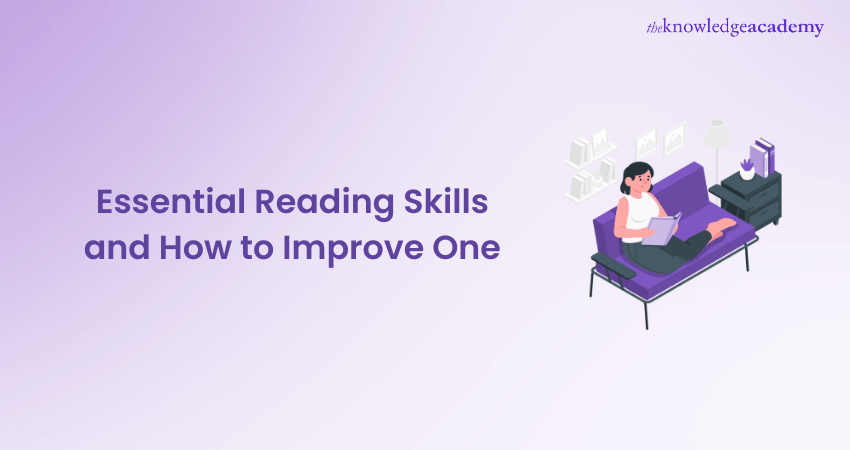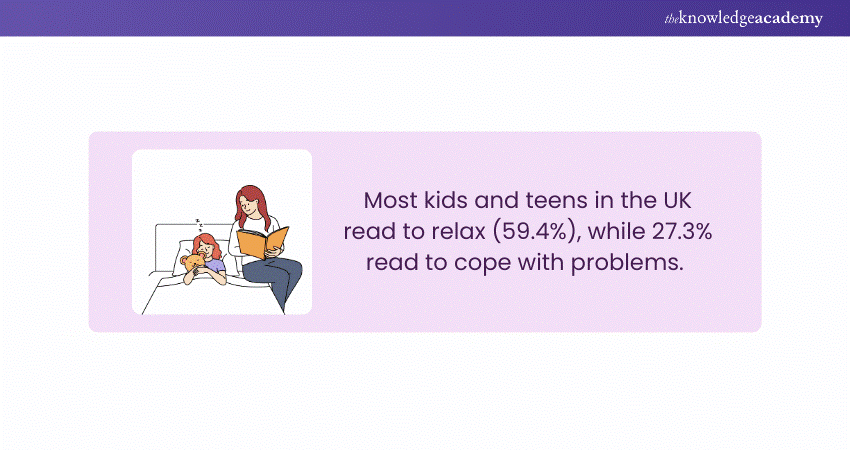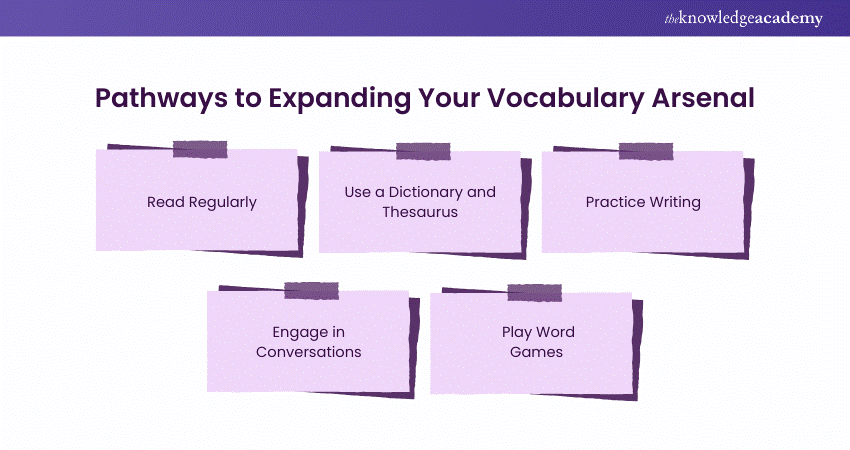We may not have the course you’re looking for. If you enquire or give us a call on 01344203999 and speak to our training experts, we may still be able to help with your training requirements.
We ensure quality, budget-alignment, and timely delivery by our expert instructors.

Reading is more than just a pastime; it’s a portal to knowledge, creativity, and a successful life. In this blog, we’ll explore essential Reading Skills that can transform your approach to reading. Whether you’re a beginner or seeking to refine your advanced techniques, you’ll discover strategies to read more efficiently and effectively.
Imagine absorbing information faster, retaining it longer, and enjoying every book you read. Ready to unlock your full reading potential? Dive in to discover how to read smarter, not harder, and revolutionise your reading journey!
Table of Contents
1) What Does Reading Mean?
2) Types of Reading Skills for Success
3) Types of Reading Techniques
4) How to Improve Your Reading Skills
5) Conclusion
What Does Reading Mean?
Reading is not just about decoding words; it's a foundational step toward mastering Critical Reading, where comprehension meets analysis. It involves deciphering written symbols and letters to grasp their meaning. Reading is among the four fundamental language skills:
a) Listening
b) Speaking
c) Writing
Typically, reading is the third skill you develop, after listening and speaking. When we read, we decode written symbols (letters, punctuation, spaces) and transform them into meaningful words and sentences. Much like reading different types of Report Writing, each requires understanding its format and structure to fully comprehend the message being conveyed.
This can be done silently in your minds or aloud, vocalising each word.

To read effectively, you need to:
a) Recognise the words you see (word recognition)
b) Understand their meaning (comprehension)
c) Connect words and their meanings to read smoothly and accurately (fluency)
By mastering these skills, reading becomes an automatic and enjoyable activity.
Types of Reading Skills for Success
Reading Skills are important for academic and personal success. Here are some key types of Reading Skills that can help you become a more effective reader:
1) Fluency
Fluency involves recognising words quickly and effortlessly, allowing for better comprehension and enjoyment of the text.
Importance:
Fluency allows readers to recognise words quickly and effortlessly, which enhances comprehension and enjoyment of the text.
Development Tips:
a) Regularly read passages aloud to improve accuracyand develop Speed Reading skill.
b) Re-read familiar texts to build confidence and fluency.
c) Read with a partner or teacher who can provide feedback and support.
2) Decoding
Decoding is the method of translating written words into their spoken equivalents.
Importance:
Fundamental for early readers, decoding involves understanding the relationship between letters and sounds.
Development Tips:
a) Understand the sounds associated with each letter and letter combination.
b) Engage in games and exercises that reinforce word recognition.
c) Start with easy books and gradually move to more complex texts.
3) Vocabulary Development
A robust vocabulary enhances comprehension and allows readers to understand and engage with more complex scripts or texts.

Importance:
A strong vocabulary allows readers to understand and use new words effectively.
Development Tips:
a) Expose yourself to a variety of genres and subjects.
b) Keep a list of new words and their meanings.
c) Play games like Scrabble or crossword puzzles to make learning new words fun.
4) Sentence Structure & Cohesion
Sentence Structure & Cohesion involves recognising how sentences are constructed and how they connect to form a coherent narrative or argument.
Importance:
Helps readers follow the flow of ideas in a text.
Development Tips:
a) Break down sentences to understand their components.
b) Write your sentences to reinforce understanding.
c) Look at well-written texts to see how sentences are effectively constructed.
5) Reading Comprehension
Reading comprehension is understanding, interpreting, and analysing what you read.
Importance:
Involves making sense of the text, drawing inferences, and connecting it to existing knowledge.
Development Tips:
a) Pose questions about the text to deepen understanding.
b) Write summaries of what you read to reinforce comprehension.
c) Talk about the text with others to gain different perspectives.
6) Memory and Focus
Good reading requires remembering what you’ve read and staying focused on the text.
Importance:
Crucial for retaining information and understanding the overall message.
Development Tips:
a) Use mindfulness techniques to improve concentration.
b) Jot down key points while reading to aid memory.
c) Go over what you’ve read to reinforce retention.
7) Attention to Detail
Attention to detail involves noticing and understanding the finer points of a text.
Importance:
Essential for tasks requiring precision, such as proofreading or analysing complex documents.
Development Tips:
a) Take your time to read carefully.
b) Use a highlighter to mark important information.
c) Focus on small text sections to understand them thoroughly.
8) Reasoning & Background Knowledge
Reasoning & Background Knowledge involves critical thinking and the ability to draw logical conclusions from the text.
Importance:
Helps readers draw logical conclusions and understand the text more deeply.
Development Tips:
a) Talk about what you’ve read to explore different viewpoints.
b) Connect new ideas to what you already know.
c) Analyse and evaluate the text to understand its deeper meanings.
By developing these Reading Skills, you can enhance your ability to absorb, analyse, and retain information, leading to greater success in both academic and personal pursuits.
Acquaint yourself with comprehension, techniques, and problems of reading in our Speed Reading Course - Sign up now!
Types of Reading Techniques
Depending on your goals, several reading techniques can help you read more effectively. Here are some of the most common ones:
1) Skim Reading
Technique: Rapidly reading to get an overall impression of the text without focusing on every detail.
Uses:
a) Previewing Material: Skim through a text before a detailed reading session to understand the main ideas and structure.
b) Determining Relevance: Identify which information is important and where to focus your attention.
c) Refreshing: Quickly review material before an exam to recall main points.
Note: Skimming helps grasp the gist of a text but may miss finer details, making it unsuitable for a comprehensive understanding of complex subjects.
2) Scan Reading
Technique: Quickly locating specific information within a text by looking for keywords, dates, names, or specific data.
Uses:
a) Finding Information: Locate particular pieces of information in indexes, tables of contents, or glossaries.
b) Specific Data: Quickly find specific data in long articles or reports.
c) Locating Answers: Efficiently find answers during exams or assignments.
Note: Scanning saves time and pinpoints relevant information but may not provide a deep understanding of the broader context.
3) Active and Intensive Reading
Technique: Engaging deeply with the text by asking questions, making connections, and taking notes.
Uses:
a) Studying Academic Material: Ideal for in-depth study of complex subjects.
b) Enhancing Comprehension: Improves understanding and retention of information.
c) Encouraging Critical Thinking: Promotes critical evaluation and analysis of content.
d) Strategies: Annotate the text, highlight key points, jot down questions, and summarise material in your own words.
4) Analytical Reading
Technique: Analysing the text to evaluate and critique its content.
Uses:
a) Identification: Identify the author’s arguments, claims, and supporting evidence.
b) Assessment: Evaluate the credibility and reliability of the information.
c) Recognition: Recognise underlying assumptions and potential biases.
d) Comparison: Compare the text with other relevant sources to develop a comprehensive perspective.
Note: Analytical reading goes beyond comprehension to provide a thorough understanding of complex concepts.
Master your skills for data synthesis and impactful storytelling in our comprehensive Report Writing Course – Register now!
How to Improve Your Reading Skills?
Improving your Reading Skills involves practice and the use of effective strategies. For additional help, a Reading Strategies PDF can offer structured guidance to boost your progress. Here are some tips to help you enhance your reading abilities:
Set Reading Goals:
Determine what you want to achieve with your reading and set specific goals.
a) Practice Regularly:
Make reading a daily habit to build and maintain your skills.
b) Expand Your Vocabulary:
Learn new words and their meanings to improve comprehension.
c) Use Reading Techniques:
Apply different reading techniques, such as skimming and scanning, to suit your purpose.
d) Take Notes:
Jot down important points and summaries to reinforce your understanding.
e) Discuss What You Read:
Engage in discussions about your reading to deepen your comprehension and gain new perspectives.
f) Read Diverse Materials:
Explore different genres and types of texts to broaden your reading experience.
Conclusion
Improving your Reading Skills requires dedication and practice. By understanding various reading techniques and applying practical strategies, you can enhance your efficiency and enjoyment. So, grab a book, set your goals, and start your journey to becoming a masterful reader today!
Are you facing creative writing challenges? Handle these challenges with ease in our Creative Writing Course - Sign up now!
Frequently Asked Questions
How can I Improve my Reading Comprehension?

One can improve reading comprehension by expanding vocabulary, practising regularly, and using techniques like summarising and questioning.
What are Some Effective Reading Techniques for Studying?

Effective reading techniques for studying include:
a) Intensive reading for detailed understanding,
b) Skimming for an overview
c) Scanning for specific information.
d) Taking notes and summarising key points.
What are the Other Resources and Offers Provided by The Knowledge Academy?

The Knowledge Academy takes global learning to new heights, offering over 30,000 online courses across 490+ locations in 220 countries. This expansive reach ensures accessibility and convenience for learners worldwide.
Alongside our diverse Online Course Catalogue, encompassing 19 major categories, we go the extra mile by providing a plethora of free educational Online Resources like News updates, Blogs, videos, webinars, and interview questions. Tailoring learning experiences further, professionals can maximise value with customisable Course Bundles of TKA.
What is The Knowledge Pass, and How Does it Work?

The Knowledge Academy’s Knowledge Pass, a prepaid voucher, adds another layer of flexibility, allowing course bookings over a 12-month period. Join us on a journey where education knows no bounds.
What are the Related Courses and Blogs Provided by The Knowledge Academy?

The Knowledge Academy offers various Personal Development Courses, including the Creative Writing Course and the Speed Writing Course. These courses cater to different skill levels, providing comprehensive insights into 8 Powerful Tips and Techniques for Persuasive Writing.
Our Business Skills Blogs cover a range of topics related to critical analysis, offering valuable resources, best practices, and industry insights. Whether you are a beginner or looking to advance your Critical Reading Skills, The Knowledge Academy's diverse courses and informative blogs have got you covered.
Upcoming Business Skills Resources Batches & Dates
Date
 Speed Writing Course
Speed Writing Course
Fri 27th Jun 2025
Fri 29th Aug 2025
Fri 24th Oct 2025
Fri 5th Dec 2025






 Top Rated Course
Top Rated Course



 If you wish to make any changes to your course, please
If you wish to make any changes to your course, please


